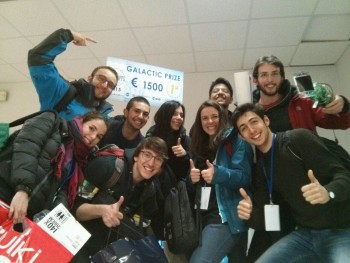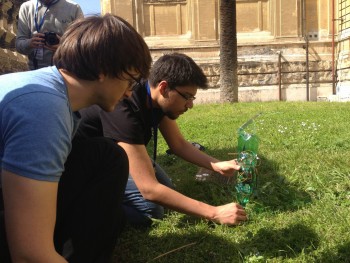The Space Apps Challenge event provided many excellent projects again this year, and a team in the ESA-supported Rome event location is among the big winners. In May 2015, the CROPP land-monitoring project received the ‘Galactic Impact’ global award.
The International Space Apps Challenge is a mass collaboration event focused on space exploration that takes place over 48 hours in cities around the world. The event embraces collaborative problem solving with a goal of producing open-source solutions to address global needs applicable to both life on Earth and life in space.
The winning Roman group, nine students in total, eight of whom study together at the same university plus one – their hardware designer – who is still in high school, were first-time entrants in the Space Apps Challenge hackathon. They study a range of topics from computer science and control engineering, to artificial intelligence and robotics.
The CROPP (Cultures Risks Observation and Prevention Platform) group solved the ‘crop alert – learning from the growers’ challenge; they designed a simple installation in a recycled PET bottle that can be set up in a field where crops are growing. The device monitors weather and can even distinguish between different insect noises to predict crop-threatening conditions. This ‘bottle bot’ uses optical and radar satellite images combined with ground data to provide a real-time crop risk assessment. The data is then relayed back to a smartphone as an alert.
ESA’s scientists and engineers provided several challenges for the event this year. The goal of each participating group is to solve a challenge using existing space science infrastructure, simple and easily reproducible hardware and an app interface that will allow users to take advantage of the technology. All resulting hardware and software remain open source and available to everyone. This year there were 13706 participants from 133 locations around the world providing 949 projects.
This year’s excellent result is the best, so far, from when ESA has supported the Rome event in the last three years. The Roman group wanted to create something that would have an impact on the world. They were particularly concerned with the future of agriculture and protecting global food production. The team picked a task that complimented the group’s skill set and that they found interesting, only selecting their challenge a few days before the event.
“We wanted to solve a real problem and do something that could be actually useful in the real world,” said Valentina Celani, web developer for the CROPP team.
Despite being a competition, the event is very friendly. Groups collaborate with each other and learn from each other’s projects. “There are so many fantastic projects, I almost feel bad for having won,” said Giorgio Severi, android developer for CROPP.
NASA and ESA engineers were on hand to help when needed, for example, assisting the team to know which satellites data they could use.
The group also meet with ESA engineers and scientists at ESRIN, Frascati, to discuss the feasibility of the project and possible developments in the long term.
“This is our third SpaceApps event in Rome, and our greatest success since our involvement. This will probably make our participants even more enthusiastic” said Maryline Lengert, ESA coordinator for the event. “We are extremely proud to have given the opportunity to a team in Rome to become a global winner,” said Filippo Angelucci, Head of ESA’s IT Department, which supported the event.
About Space Apps
The International SpaceApps Challenge Hackathon began in 2012. The world-wide challenge is coordinated and judged by NASA, with local events held simultaneously at universities and research institutions. For the last three years, ESA’s IT Department has worked with Sapenzia Università di Roma and the US Embassy in Rome to organise and host the Roman event.



Discussion: no comments